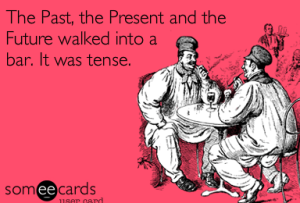Tenses: Before and After

The word ‘tense’ comes from the Old French “tens,” which in turn comes from the Latin “tempus,” which translates to ‘time.’
The tenses are an all important aspect of language, they’re the way in which we refer to something we’ve done or are going to do — something we should do then, is learn a little more about them.
Tense is how we locate an event in relation to time; we have the past, the present, and the future. In English we have a number of words and conjugations that we use in reference to the particular tense we’re talking in; while the changes are often simple enough, sometimes there are little things that we take for granted, making it especially difficult for somebody new to the language.
One little thing that makes this subject more elaborate and complex is the reference point; things change even more when talking about the past, present or future in relation to another point before, at or after said event.
Consider these examples, all of which I hope you’ll agree mean or reference something slightly different: “I had written,” “I have written,” “I will have written,” “I wrote,” “I am writing,” “I will write,” “I write” and “I would write.”
That’s a little more difficult right? Well, what’s more, they all have names; let’s start with the present:
Simple Present: “He speaks.”
Present Progressive: “He is speaking.”
Present Perfect Simple: “He has spoken.”
Present Perfect Progressive: “He has been speaking.”
Now how about the past:
Simple Past: “He spoke.”
Past Perfect Simple: “He had spoken.”
Perfect Past Progressive: “He had been speaking.”
The future:
Future I Simple: “He will speak.” Also, “He is going to speak.”
Future II Simple: “He will have spoken.”
Future I Progressive: “He will be speaking.”
Future II Progressive: “He will have been speaking.”
Many languages use tenses in different ways, English has very similar uses to Germanic languages and Japanese, containing two morphological tenses in past and non-past (which covers both present and future); Latin has six, as it contains relative-tenses (another subject to explore); The Pama-Nyungan Languages have different tenses in remote-past, recent-past, today-past, present, near-future, and remote-future. Ancient Greek is a little different as it also contains ‘moods,’ a way to distinguish aspect only, such as indicative, or “bounded,” and optative, or “wished for.” There are even some languages that don’t use tense, they’re called — rather understandably — tenseless languages, and such languages are Burmese, Dyirbal and Chinese.
What languages do you know that use tenses differently to English? Is this a subject with a little more detail than you first thought?
